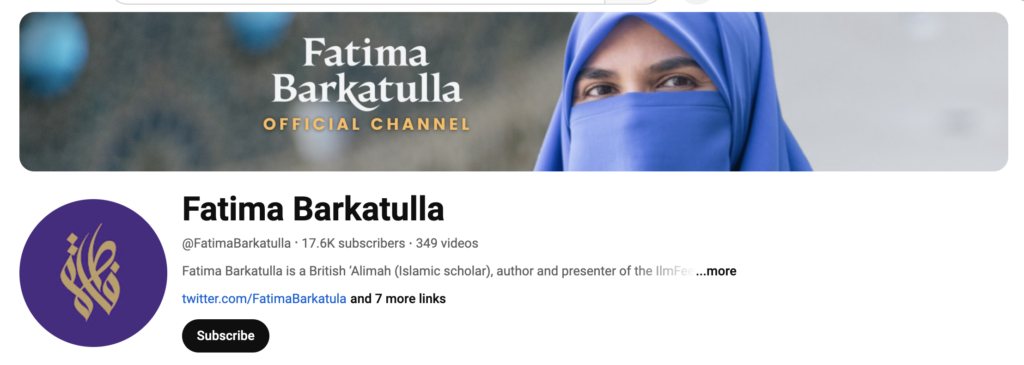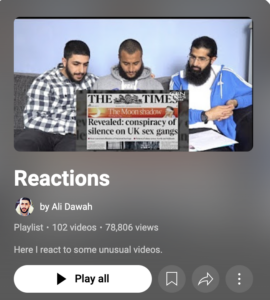by Khadijah Elshayyal and Sadek Hamid
This article links directly to the Digital British Islam: Podcast Archive.
In recent years, the medium of the podcast has emerged as a platform of choice for a range of Muslim content creators. As new media platforms continue to grow, podcasting provides a convenient and relatively low-cost means of creating content. Like other podcasters, Muslim podcasters are implicitly concerned with gaining followers, attracting new audiences, and monetisation, and to this end, many will court controversy by discussing taboo subjects and/or triggering confrontation with other content producers. Podcasts attract diverse audiences by addressing a range of conversation topics, covering faith, Muslim identities in diasporic communities, gender dynamics, racism, Islamophobia and commentary on popular culture.
Other platforms used by content creators, such as TikTok, Snapchat, Instagram and even Twitter are generally all about scrolling while podcasts are often consumed in the background while the listener engages in other activities, but equally, for some audiences, we find that podcasts are seen as a source of analytical/educative content to be studied. Often podcast content takes a conversational approach and is sliced into short clips that are then circulated with ease on other platforms. Optimised for high levels of interaction and for their shareability, these clips can then go viral, and elicit responses and engagement from other content-creators and platforms. The conversation style is often laid-back and informal. Even for serious topics, there is room for humour and banter – setting the podcast apart from the more traditional interview style.
The Rise of British Muslim Podcasters
In the UK, some of the popular British Muslim podcasts include IlmFeed Podcast, Freshly Grounded and The Muslim Vibe. In our fieldwork for the Digital British Islam project, participants expressed concern about a perceived tension between captivating and retaining audiences through performativity and efforts to maintain authenticity. There is a cognisance of how algorithms impact visibility and engagement and content creators factor this into how they release content: including timing, choice of headlines and hashtags, the tagging of other content creators and the highlighting of phrases and images, to mention but a few.
Our participants spoke about how refreshing it was for them to produce and to engage with podcasts. Fatima Barkatulla, a scholar, author and public figure, who presents podcast episodes for IlmFeed, spoke about how emancipatory it was for her to be able to speak at length on her own terms, in a safe space, without the pressure of having to get her message across concisely in an allotted time, often in response to hostile or suspicious questioning – a common experience she had when engaging with the mainstream media as an interviewee.

Focus group participants talked about how they were able to have podcasts playing in the background as they went about their busy lives – driving, cooking or carrying out chores. The podcast meant they could keep their brain ticking and maximise their use of time as they carried out functional everyday tasks. However, some cited a worry that the long-form nature of podcast conversations could make it easier for them to become echo chambers, while others were of the opinion that the podcast scene was something of an echo-chamber unto itself and that content creators, in that sense, they were playing to a crowd and their perception of the extent of that audience was inaccurate and overblown.
Gender Dynamics in Podcasting
One of the main issues currently animating discussion within these spaces are: feminism, the role Muslim women in society and gender relationships. If one surveys female platforms, it appears that Muslim women have different concerns compared to their male counterparts and seem to be more interested discussing everyday matters such as education, family, health and the realities of living as Muslims in a minority context. For instance, shows such as the Amaliah Podcast, Honest Tea Talk and Not Another Mum Pod focus on faith, culture, relationships and motherhood from a Muslim woman’s perspective, while offering critical reflections on religious norms and practices. These conservations provide an alternative to the male-centric spaces of traditional mosques or religious seminars, where female presence is often either formally limited, or where many females report feeling inhibited from fully participating.

Our research also identified differences between Muslim male and female podcasters in the ways males speak about women on male-hosted podcasts. Popular male-led platforms often have a particular of view of Muslim women and their role in society and discuss male-female dynamics within the paradigm of aggressive masculinity movements such the “Muslim Red Pill” phenomenon, also referred to as “The Muslim Manosphere” or “Alt-Wallahs.” These online Muslim communities of men are highly mobilised, engaged and frequently angry about not being able to carve out their own space within the West’s “culture wars,” where debates about gender, race, multiculturalism, and religion have been cast as crises. Perhaps the best known in this genre is Mohammed Hijab and his friend and collaborator ‘Ali Dawah.’ Both have a substantial following on their different social media channels and are known for their combative styles when engaging non-Muslims in Speakers Corner in Hyde Park, London. Their rising popularity has also incentivised intra-Muslim confrontation and cancel-culture, while obfuscating important debates with disinformation.

Displacing Traditional Islamic Authority
One of the most significant consequences of the rise of British Muslim podcasters is the displacement of traditional Islamic authority. Historically, Islamic religious authority was rooted in scholars who underwent years of formal education and study. These scholars were seen as the guardians of religious knowledge, and acquired authority through accreditation and teaching at mosques, madrasas, and Islamic universities. In contrast, most popular Muslim podcasters in the UK do not have formal religious training or qualifications; instead, many rely on their personal experiences, charisma, and social media presence to build an audience.
This contrast is of particular note since many young people relate that they see their local imams and mosques as disconnected from and irrelevant to their everyday experience and struggles as Muslims in the West. Many are seen to be remote and unable to understand or engage with the challenges as a result of language barriers, generational gaps, or cultural illiteracy. This disconnect has increased disillusionment with established religious authorities and enabled social entrepreneurs to fill the void and offer relevant, less hierarchical, and more democratised fora for religious discussion.
For many younger Muslims though, these digital platforms offer a more relatable and accessible form of religious engagement. This democratisation of religious discourse has allowed a wider range of voices to participate in Islamic discussions, but it has also raised questions about the legitimacy of these new digital figures. For traditional scholars, this shift represents a challenge to the established norms of religious authority.
Some of our participants cited an anxiety that the rise of “YouTube sheikhs” and “Instagram imams” will lead to a superficial understanding of Islam, where religious knowledge is shaped more by popularity than by scholarly rigour. Others argue that this new generation of digital Islamic influencers lacks the depth of knowledge required to provide proper religious guidance, particularly on complex theological or legal issues.
Monetisation and the Commodification of Islam for Views
Another significant factor shaping British Muslim podcast content is the increasing pressure to commodify religious knowledge in order to attract larger audiences. In the podcasting world, success is often measured by the number of downloads and views, audience retention, and social media engagement. This focus on metrics often results in a type of content production that mirrors the broader ‘marketing’ trends of influencer culture.
This commercialisation of religious knowledge can blur the line between genuine spiritual guidance and content created for profit, further complicating the relationship between digital platforms and traditional Islamic authority. The commodification of religious discourse can also result in what some scholars call “Pop Islam,” where religious discussions are simplified and repackaged for mass consumption on platforms such as YouTube, Instagram and TikTok so that they might “go viral”. While this model can help reach a wider audience and make Islamic knowledge more accessible to non-specialist listeners, it also raises concerns about the depth and quality of the religious knowledge being transmitted.
The drive for higher viewership and engagement is another key factor influencing the content produced by British Muslim podcasters. In the digital era, platforms like YouTube and Spotify reward content that attracts more views, likes, and shares. These metrics play a significant role in determining the visibility and reach of podcast episodes, which in turn affects the topics that podcasters choose to cover. The pressure to generate high engagement can lead to content that is more focused on clickbait-style headlines, celebrity interviews, or debates about hot-button issues, rather than in-depth discussions on Islamic jurisprudence, spirituality, or ethics.
Conclusion
The rise of British Muslim podcasters represents a significant shift in the way religious knowledge is produced, consumed, and transmitted within the UK Muslim community. Podcasting platforms offer an accessible and flexible space for a diverse range of voices to engage with Islamic discourse, often in ways that challenge the dominance of traditional religious authorities. However, this shift is not without its challenges. Gender dynamics, the commodification of religious knowledge, and the pressures of digital metrics all play a role in shaping the content produced by British Muslim podcasters, raising ethical concerns and tensions. At the same time, the rise of new authorities in the digital ecosystem raises important questions about the future of Islamic scholarship and the continued, evolving role of traditional scholars in an increasingly digital world.
